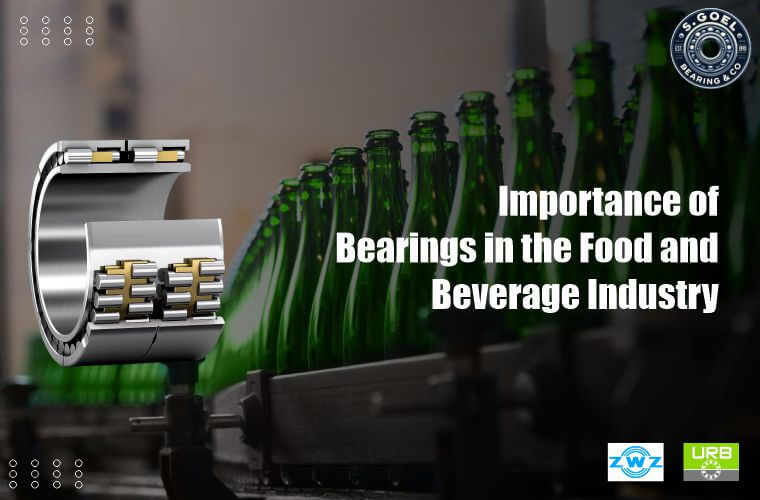Bearings are frequently disregarded machinery parts essential to many industries’ practical and seamless operation. Their significance is especially noticeable in the food and beverage industry since they guarantee the dependability, security, and quality of food-producing procedures. This extensive blog will discuss the importance of bearings in the food and beverage industry.
Bearing Importance in the Food & Beverage Industry
1. Precision and Accuracy in Food Processing
Bearings are what hold food-making equipment together. Their precise movement ensures that everything from slicing tools to packaging equipment handles products correctly and consistently. For example, in the meat processing business, bearings in slicing machines ensure all the cuts are the same, cutting down on waste and improving the product’s quality. Bearings in bottling lines in the beverage business ensure the bottles are filled and sealed correctly, which keeps the products from getting dirty or having problems.
Specific Examples:
- Slicing Machines: Slicing machines use bearings to cut meat to the proper thickness, reducing wastage and providing equal servings.
- Packaging Machines: Bearings in packaging machines ensure that the sealing and marking are done correctly, keeping the product from getting contaminated and maintaining its integrity.
- Filling Machines: Bearings in filling machines ensure containers are filled to the right level. This keeps the quality of the product by stopping overfilling or underfilling.
2. Hygiene and Food Safety
The food and drink business has strict hygiene standards to keep food safe and avoid contamination. When chosen and maintained correctly, bearings can make a big difference in meeting these standards. For instance, food-grade lubricants in stainless steel bearings can withstand strong cleaners and keep contaminants from building up. Also, sealed bearings can keep wetness and dirt out of internal parts, which lowers the risk of contamination.
Specific Examples:
- Stainless Steel Bearings: These bearings are perfect for food processing applications since they are easy to clean and corrosion-resistant.
- Sealed Bearings: Sealed bearings keep moisture, dirt, and other contaminants out of internal parts, which lowers the risk of contamination and ensures the safety of the product.
- Food-Grade Lubricants: Food-grade lubricants guarantee that the bearings are safe for food processing applications and help prevent contamination.
3. Efficiency and Productivity
Bearings help make food and drink production lines more efficient and productive. Bearings keep things running smoothly and without interruptions, which cuts down on downtime and boosts output. For example, in the dairy business, bearings in milking machines make it easier to get milk from cows, cutting labor costs and increasing production. As a result of even heat spread, ovens’ bearings help bakeries ensure their products are always of high quality and use less energy.
Specific Examples:
- Belt Conveyors: Bearings in belt conveyors ensure that goods move smoothly and quickly, lowering the risk of damage and increasing total productivity.
- Mixing Machines: Bearings in mixing machines ensure that the ingredients are mixed well, which stops uneven mixing and raises the quality of the final product.
- Packaging Machines: Bearings in packaging machines ensure that goods are packed correctly and quickly, reducing waste and boosting total output.
4. Durability and Longevity
High-quality bearings are made to last in harsh food and beverage environments where they are always used. Their strength means they will last a long time, which lowers maintenance costs and keeps output running smoothly. For example, filling and sealing machines in the canning business need bearings that can handle big loads and rough conditions without losing their ability to do their job. Food and drink companies can protect their equipment and keep downtime to a minimum by buying long bearings.
Specific Examples:
- Heavy-Duty Bearings: With their ability to handle heavy loads and rough conditions, these bearings are perfect for food preparation.
- Corrosion-Resistant Bearings: Bearings made from materials that do not rust can help keep them in good shape and last longer in places with a lot of moisture or acidic substances.
- High-Temperature Bearings: Bearings made for high temperatures can handle the heat from ovens and sterilizers, ensuring they work reliably.
5. Temperature Tolerance
The food and beverage industry frequently uses processes at high or low temperatures. Bearings must be able to resist these temperature extremes while maintaining performance. High-temperature bearings, for example, can keep their integrity in ovens and sterilizers, whereas low-temperature bearings can function reliably in refrigeration systems.
Specific Examples:
- High-Temperature Bearings: When it comes to high-temperature applications, these bearings are perfect for ovens, sterilizers, and other hot places.
- Low-Temperature Bearings: Some bearings can work at low temperatures, which makes them perfect for use in refrigerator systems and other cold places.
- Proper Lubrication: Ensuring that bearings can work at the suitable temperature range requires using the right type and amount of lubrication.
6. Customization and Versatility
There are a lot of different products and processes in the food and drink business. As needed, bearings come in various sizes, types, and materials. Small-scale equipment, for instance, can use tiny bearings, while heavy machinery in factories needs large bearings. Because bearings are so flexible, they can be used in various food and drink manufacturing environments.
Specific Examples:
- Miniature Bearings: Because these bearings are small and light, they work well in machines like food grinders and blenders.
- Large-Sized Bearings: These bearings are great for industrial machines like mixers and conveyors because they can hold a lot of weight.
- Customized Bearings: It is possible to change the size, material, and load capacity of bearings to meet unique needs.
The Bottom Line
Bearings are essential parts of the food and drink industry because they keep important machines running smoothly and efficiently. To avoid expensive problems and keep product quality high, it is essential to know about the different kinds of bearings, how they work, and how important it is to maintain them properly. Food and drink companies can make their plants run more efficiently, cut downtime, and ensure the safety and quality of their goods by spending money on bearing maintenance.



